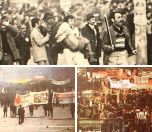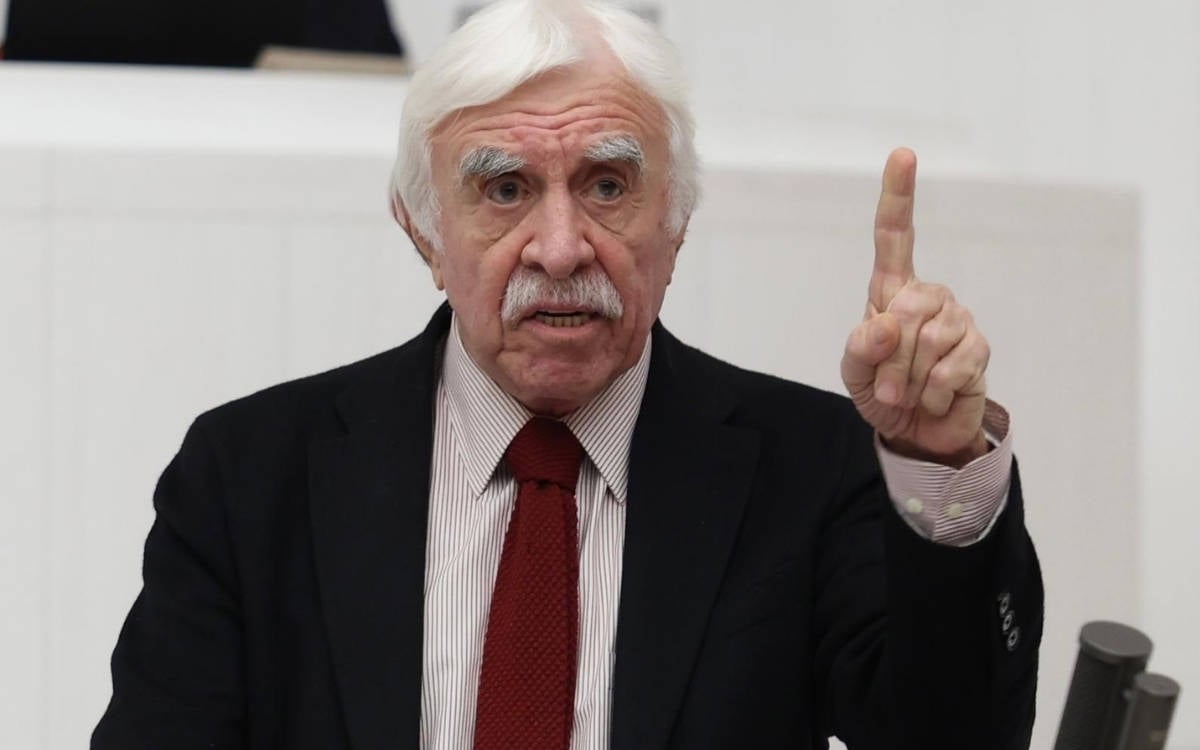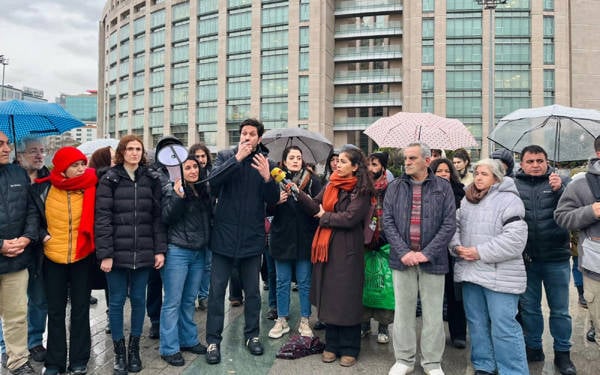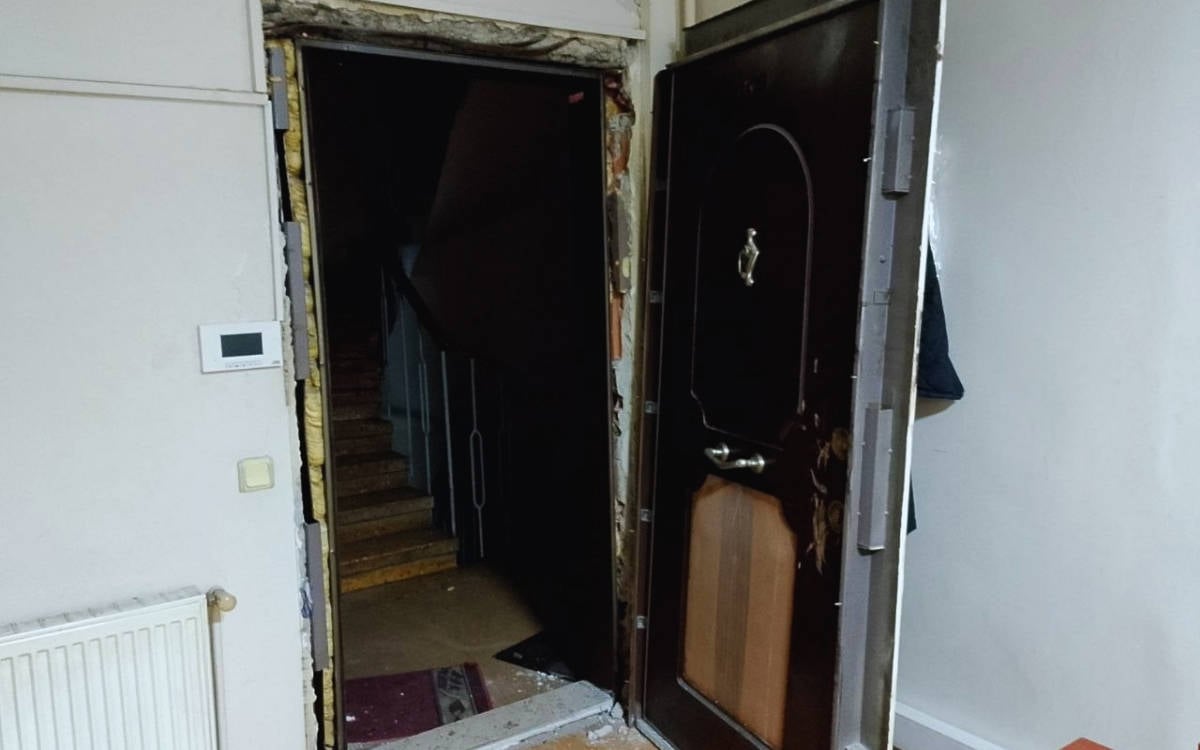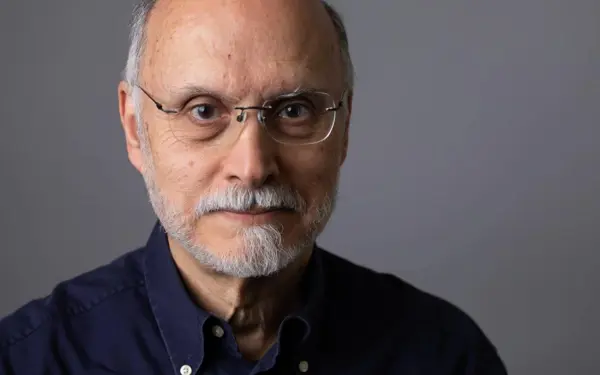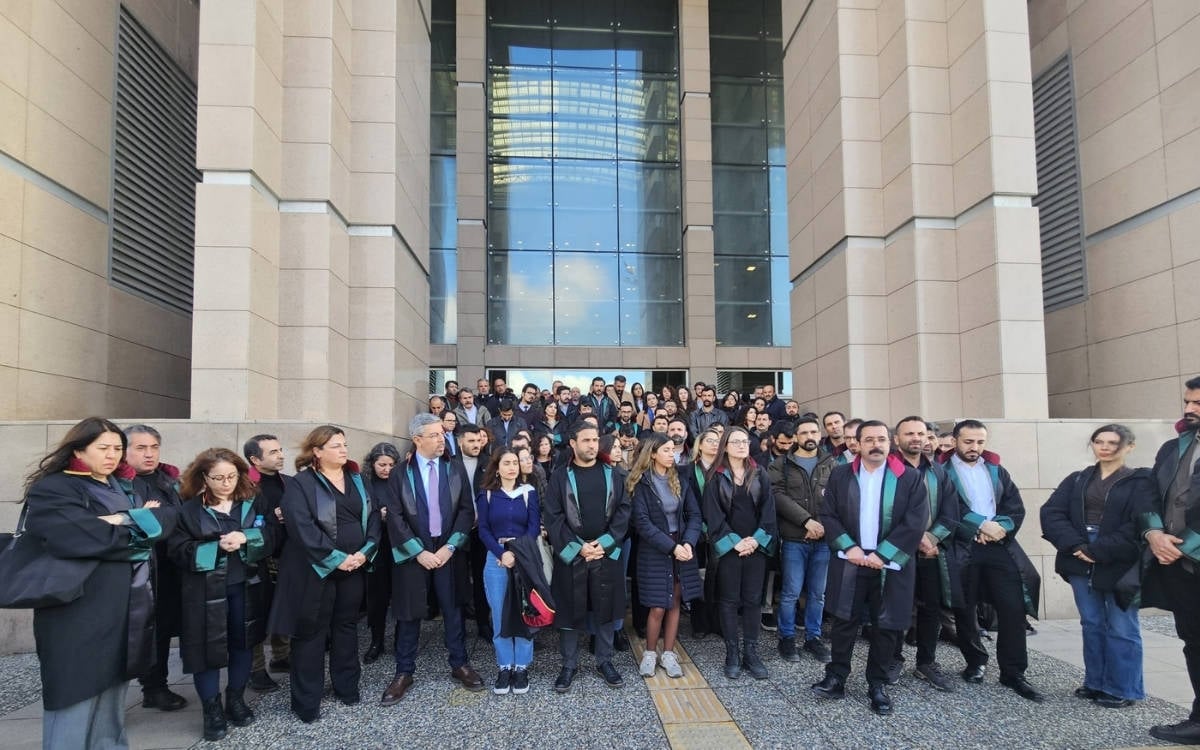Click to read the article in Turkish
"Afterwards we all managed to meet in Beşiktaş. I was responsible for the coach. We looked [at the list of names], we counted and counted, Bayram wasn't there. Then we learned that Bayram was dead. We'd been walking arm in arm, but we lost him."
"My father was full of joy about going to that demonstration that day, but he never returned. Of course what we experienced should be considered a massacre."
Bayram Çıtak, 37, from the town of Şarkışla in Sivas, was a teacher and member of TÖB-DER. He lived with his wife and three sons in Ankara.
Bayram Çıtak had asked to be appointed to a new teaching position that would take him from Sivas to the Mamak Derbent Primary School in Ankara, because his son, Mete Çıtak, was about to start middle school, and there was no middle school in their village.
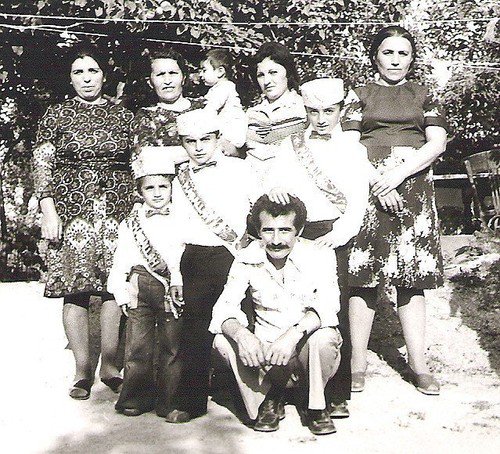
A graduate of the Pamukpınar Teaching College, Bayram Çıtak became involved in TÖB-DER not long after arriving in Ankara. He tried to provide for his wife and three children with his teacher's salary.
According to the autopsy report his cause of death was mechanical asphyxia as a result of compression of the chest, and internal bleeding caused by numerous rib fractures.
We hear the story of Bayram Çıtak from his eldest son, Mete Çıtak, who lives in Izmir, and his friend Selahattin Koçak from TÖB-DER and the Unity Solidarity movement.
Bayram Çıtak's Son, Mete Çıtak tells
There were us three kids. I was the oldest. But when I say oldest, I was only 13 when I lost my father. I was still a child. My siblings were ten and five.
We took the news that my father had died really badly. Everyone in the family was distraught, everyone started crying. Imagine a 13-year-old child who has learned his father has died. Whatever a child might go through at such a time, I went through it all.
.jpg)
At that time we were living in Ankara, in Ayrancı; but my dad worked in Mamak. My dad was really a village teacher.
He was a member of TÖB-DER. He'd go everywhere with TÖB-DER, to all the demonstrations. He was well liked at the association.
"A day of celebration is now remembered for its dead"
As far as I know, 37 people lost their lives there that day. It's a day, a rally, that should have had a celebratory atmosphere, but now we remember it, commemorate it together with the dead.
After losing my dad, our house was filled with great sadness. Nothing was the way it was before. Back then we were three siblings, now we're two. After losing my father, my mum started working, she brought us up.
My dad was a good father to all of us. He was enough for all of us. He was everything you expect a father to be.
He was also greatly loved by his friends.
One of my strongest memories of my father is this: My dad was my teacher too. He forbade me from calling him "dad" at school. He'd say, "Call me 'sir' at school." One day I said "dad," it just slipped out. I got a bit of hiding for that.
"None of those responsible have been punished"
This is what I generally think about 1 May 1977. If those responsible for all we've been through had been made known, if they'd been punished, I would probably have felt differently. But not a single one of those responsible has been named, nobody's been punished. No investigation was even carried out against anyone. The trial reached the statute of limitations. Over 40 years have passed. Easy to say, not so easy to live.
It's such a shame for this country. The truth behind an incident like this should have been uncovered. Because the truth of 1 May 1977 has never been revealed, we will continue to suffer like this for a long time. And the same things will happen again. Those responsible for people's suffering will never be found. No one will be punished.
If we live in a democratic country, then this is the exact opposite of what should have happened.
Of course, over time we got used to the fact that my dad wasn't with us. In the same way everyone else got used to it, so did we. I'm 55 years old now. I was 13 when we lost my dad. If he were still alive today, he would have been 80.
I've been able to commemorate my father every year on 1 May in Gündoğdu Square in Izmir. But this year we probably won't be able to do that either because of the pandemic.
Bayram Çıtak's friend, Selahattin Koçak tells
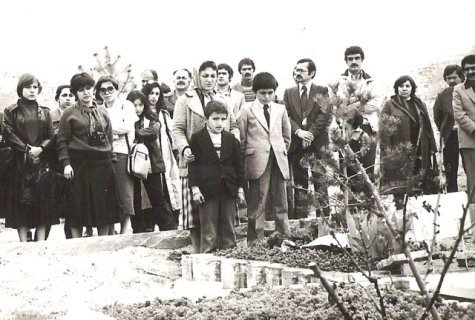
In 1976, I was involved in the administration of the Unity Solidarity [Birlik Dayanışma] movement, working in schools. It was through this work that I met Bayram at the Derbent Primary School. We were from the same area, we were neighbours. I went to the Teaching College at Pazarören, he was at Pamukpınar. These were schools that had once been Village Institutes.
Over time, our discussions moved on to deeper topics, we got into political debates, and then Bayram also joined the Unity Solidarity movement.
Bayram had three children, one of them had leukaemia. We'd go to the hospital together, to Hacettepe, for his son's blood transfusions. He'd feel really bad whenever he went on his own.
The family got by on one wage. They lived in a shanty in Ayrancı. Bayram was a poor teacher who lived in such a place, trying to bring up three children, one of them ill, on a single wage.
At the same time he was a determined, resolute comrade, a real fighter.
He was a courageous warrior. He was kind-hearted. At times he could also be hot-tempered. At TÖB-DER meetings, for example, he'd get riled up quickly. That was entirely because of his financial difficulties. He loved other people. He'd regularly get together with his friends from school, with his other friends. Everyone loved and respected him.
We went to the demonstration on 1 May 1977 together. We decided to sit somewhere before we went. We went to a restaurant on Necatibey Street in Ankara and had some food and a couple of glasses of rakı as well, doubles, and shared our woes.
Then we got on the same coach and went to Istanbul. We got off in Beşiktaş and joined the TÖB-DER contingent. We joined the group around midday, and it was around 4-4.30pm by the time we reached the square. We were in front of what is now the Marmara Hotel. When Kemal Türkler's speech was coming to an end he said, "Come on guys, let's head back to the buses."
Bayram and I were walking side by side, arms linked. Then suddenly all hell broke loose, shots were fired. Our arms were linked, you know, I pulled and pulled but Bayram didn't come. They told us to run towards the stage so we did. I thought he had been shot, but he wasn't hit by a bullet. We learned about it at his funeral. Bayram died in the crush, going towards Kazancı Slope.
We had a friend called Ahmet. Ahmet and I sent the coach back to Ankara and we stayed in Istanbul for the body. We collected the body the next day and brought it to Ankara, to that shanty. From there we took him to the Karşıyaka Cemetery where we buried him.
He'd worked for 10 years, so at that time we fought to get his pension rights for his family. We got into lots of fights with the Provincial Directorate for National Education. They said to us things like, "What was he doing there?" We had to fight for it but we managed to get Bayram his pension rights for his 10 years of work.
A campaign was started through Unity Solidarity and we shared it with the whole of TÖB-DER. We tried to help his family as much as we could. After that we always kept in touch with his wife and children... (TY/DB/VK)
About Tuğçe YılmazJournalist, editor, researcher. "1 May 1977 The Voices of Those Who Lost Their Loved Ones / 1 May 1977 and Impunity" she was engaged in this dossier as a researcher, reporter, editor and writer. Her articles, interviews and reports are published in outlets such as bianet, BirGün Book, K24, 5Harfliler, Gazete Karınca and 1+1 Forum. She graduated from Ege University, Faculty of Literature Department of Philosophy. She was born in Ankara in 1991. |
 |
| This text was created and maintained with the financial support of the European Union provided under Etkiniz EU Programme. Its contents are the sole responsibility of "IPS Communication Foundation" and do not necessarily reflect the views of the European Union. |
CLICK - 1 May 1977 e-book is online
The ones who lost their lives on 1 May '77The ones whose loved ones we could talk to: Ahmet Gözükara (34, teacher), Ali Sidal (18, worker), Bayram Çıtak (37, teacher), Bayram Eyi (50, construction worker), Diran Nigiz (34, worker), Ercüment Gürkut (27, university student), Hacer İpek Saman (24, university student), Hamdi Toka (35, Seyyar Satıcı), Hasan Yıldırım (31, Uzel worker), Hikmet Özkürkçü (39, teacher), Hüseyin Kırkın (26, worker), Jale Yeşilnil (17, high school student), Kadir Balcı (35, salesperson), Kıymet Kocamış (Kadriye Duman, 25, hemşire), Kahraman Alsancak (29, Uzel worker), Kenan Çatak (30, teacher), Mahmut Atilla Özbelen (26, worker-university student), Mustafa Elmas (33, teacher), Mehmet Ali Genç (60, guard), Mürtezim Oltulu (42, worker), Nazan Ünaldı (19, university student), Nazmi Arı (26, police officer), Niyazi Darı (24, worker-university student), Ömer Narman (31, teacher), Rasim Elmas (41, cinema laborer), Sibel Açıkalın (18, university student), Ziya Baki (29, Uzel worker), The ones whose loved ones we did/could not talk to: Aleksandros Konteas (57, worker), Bayram Sürücü (worker), Garabet Akyan (54, worker), Hatice Altun (21), Leyla Altıparmak (19, hemşire), Meral Cebren Özkol (43, nurse), Mustafa Ertan (student), Ramazan Sarı (11, primary school student) The ones only the names of whom are known: Ali Yeşilgül, Mehmet Ali Kol, Özcan Gürkan, Tevfik Beysoy, Yücel Elbistanlı The one whose name is unknown: A 35-year-old man |
The voices of those who lost their loved ones: 1 May '77 and impunity
Political panorama of Turkey-1977
Film industry worker Rasim Elmas, 41, died in Taksim
Construction Worker Bayram Eyi, 50, died in Taksim
Teacher Bayram Çıtak, 37, died in Taksim
High School Student Jale Yeşilnil, 17, died in Taksim
Teacher Kenan Çatak, 31, died in Taksim
Teacher Ahmet Gözükara, 33, died in Taksim
Teacher Hikmet Özkürkçü, 39, died in Taksim
Student-laborer Niyazi Darı, 24, died in Taksim
University student Nazan Ünaldı, 19, died in Taksim
Teacher Ömer Narman, 31, died in Taksim
Laborer Ali Sidal, 18, died in Taksim
Counterperson Kadir Balcı, 35, died in Taksim
Student Hacer İpek Saman, 24, died in Taksim
Factory Worker Kahraman Alsancak, 29, died in Taksim
Laborer Hüseyin Kırkın, 23, died in Taksim
Student Ercüment Gürkut, 26, died in Taksim
Public order police officer Nazmi Arı, 26, died in Taksim
Laborer Mahmut Atilla Özbelen, 26, died in Taksim
Factory worker Hasan Yıldırım, 31, died in Taksim
Itinerant salesperson Hamdi Toka, 35, died in Taksim
Security Guard Mehmet Ali Genç, 60, died in Taksim
Factory Worker Ziya Baki, 30, Died in Taksim
Laborer Mürtezim Oltulu, 42, Died in Taksim
Teacher Mustafa Elmas, 33, Died in Taksim
Student Sibel Açıkalın, 18, died in Taksim
Laborer Diran Nigiz, 34, died in Taksim
1 May 1977 & Impunity
'The state is implicated in this crime, perpetrators must be put on trial'
'If you can't find the killers, you can't remove the stain'
'The perpetrators of the 1 May 1977 massacre got away with it'
Remembrance as a matter of dignity and the fight against impunity
Who is hiding the truth and why?





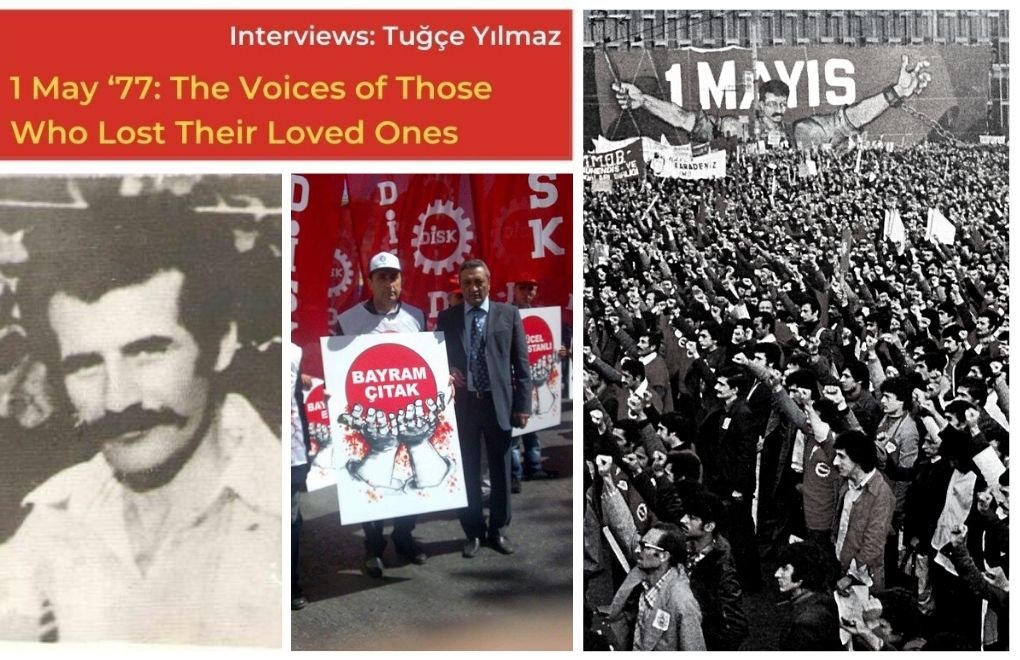
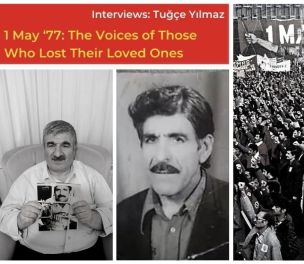
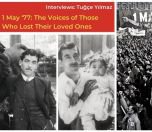
-132.jpg)
